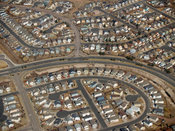A fine is a tax for doing something wrong. A tax is a fine for doing something well. Traditional methods of property taxation not only penalize property owners for improving their property but also encourages sprawl. Most of the was that this is happening is unintentional and there are several alternatives but it will take an overhaul of our current system to improve.
Towns and local communities generally plan their growth and objectives on the basis of revenues taken in from property taxes. For communities with traditional outlook planning more money means more growth. This new growth will incur more money from property taxation and a cycle from this persists.
Often time towns will give tax breaks to developers planning to come ino an area. These tax breaks are created to interest fresh development. The greater the property tax burden and land values compel owners of large tracts of lands, such as farms, forests, and open areas to sell to developers.
Less expensive housing and lower property taxes within the metropolitan fringe incites development and invigorates sprawl. This also contributes to the exodus of the white middle class to the suburban areas, known as the white flight.
There are logical means of sustainable development. These methods of development require goals and management of growth that are reasonable. They also require cooperation from communities and developers. Some cities may join forces with several other counties to set goals and plan development with consideration to a bigger picture instead of individual needs.
Traditional zoning has also been a factor in evaluating property taxes for use of the revenue. So natural zoning or zoning ordinances that allow development according to the lands natural attributes can protect wildlife, habitats, and the related industries. This also protects open space from development.
The practice of...


Taxes and Sprawl
This is one assignment out of a series of ten concerning urban sprawl. This particular essay addresses the ways taxes contribute to sprawl and the ways it could be used to fight sprawl. This paper got 10% which was the highest possible grade.
1 out of 1 people found this comment useful.